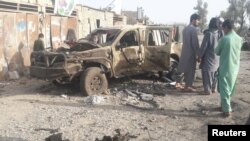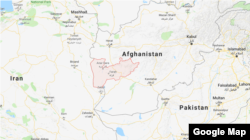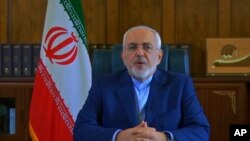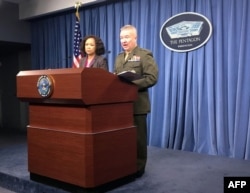Afghanistan’s western Farah province has been the scene of fierce fighting between the Taliban and the Afghan government in recent days. Afghan officials blame Iran for the unrest.
Gen. Fazl Ahmad Shirzad, provincial police chief of western Farah province, told reporters on Wednesday that Iran is supporting the Taliban in the province.
“Iran is directly funding and equipping the Taliban in Farah, and the country is involved in the recent unrest in the province,” Shirzad said. “Farah is very important for Iran, and the country sees its interests in continued unrest in the province,” he added.
Gen. Gul Nabi Ahmadzai, the former Afghan border police chief, told VOA that Iran’s support for the Taliban is not a secret.
“Iran is directly involved, and its Revolutionary Guard commanders are leading the firefight in Farah,” Ahmadzai said.
“An unholy coalition of our neighbors — Russia, Pakistan and Iran — has been formed in the region, which sees its interest in our weakness. They want to manage our security and government, and they cannot bear U.S. support for Afghanistan, and they don’t want America’s presence in Afghanistan,” Ahmadzai added.
All three countries deny charges that they want to destabilize Afghanistan.
Drought
Some experts charge that Iran is ratcheting up its support for the Taliban to disrupt developmental projects in Afghanistan, including water dams, which if completed would slow down the flow of water to Iran.
"Iran is very concerned about water dams that are being built in Afghanistan. Iran benefits from Afghanistan’s insecurity,” Khalil Parsa, a Washington-based Afghanistan expert, told VOA.
Eastern parts of Iran, neighboring Afghanistan’s western parts, have been reportedly faced with severe drought in recent years, and dozens of villages have turned to ghost towns, with residents moving to other parts of the country.
Iran has expressed concerns over water dams in western Herat, Farah and southwestern Nimruz provinces in Afghanistan, which share a border with the country.
“We cannot remain indifferent to something that undermines our environment. The construction of numerous dams in Afghanistan — including the Kajaki dam [Helmand province], Kamal Khan dam [Nimruz province], Salma dam [Herat province] and others in the north and south of Afghanistan — has affected our Khurasan and Sistan and Baluchestan provinces," Iranian President Hassan Rouhani told a regional conference last year.
Earlier this month, Mohammad Javad Zarif, Iran’s foreign minister, warned of reciprocity against Afghanistan over the issue of water rights should Afghanistan continue to disregard Iran’s demands. He did not elaborate on what “reciprocity” entails.
“At this point in time, we are left with one option, and that’s reciprocity, which means we would have to take harder measures in parts of Afghanistan,” news agency ISNA quoted Zarif as saying.
“We expect that before the Islamic Republic resorts to reciprocity, that the Afghan government regard our legal and legitimate demands,” he said.
Fatemeh Aman, a U.S- based Afghanistan-Iran affairs analyst, downplayed the role of water in shaping Taliban and Iran relations and said Iran will not directly help the insurgents in order to block the construction of water dams.
“I do not think that Iranians are up to do such an insane and senseless act at this time when they need allies more than ever,” he said. “The bonds between Iran and Afghanistan are deep, and despite many ups and downs in their relationship, both countries have managed to maintain close ties.”
The Afghan government expressed concern over ties between the Taliban and Iran but has yet to comment on Iran’s possible role in recent Taliban attacks on Farah.
U.S. Defense Department spokesperson Dana White said Thursday that Iran’s involvement in the recent developments in Farah could not be ruled out.
“I don’t think you can ever rule out how much Iran interferes throughout this region,” White said in response to a question on whether Iran had anything to do with the Farah province situation.
“Iran remains the most destabilizing factor in the Middle East.”
Last year, Gen. John Nicholson, commander of the U.S.-led NATO Resolute Support Mission in Afghanistan, said there are relations between Iran and the Taliban.
“We see some evidence of that in the western part of the country. We have “reports of that that come from locals in the western part of the country. In Farah province, in particular, we have received many reports of Iranian-backed Taliban fighting in Farah with some advanced equipment. So, we’re watching this very closely,” Nicholson said at a Pentagon briefing.
Contingency plan
Anthony Cordesman, an analyst at the Center for Strategic and International Studies, views the relationship between the Taliban and Iran more of a contingency plan.
“They are creating relationships that they hope will make the Taliban safe if it takes over from the Afghan government. It is a contingency plan,” Cordesman said. “Another source of speculation is that Iran is supporting the Taliban as a counter-balance to the growing role of ISIS inside Afghanistan.”
VOA's Rikar Hussein and Mehdi Jedinia contributed to this report.







